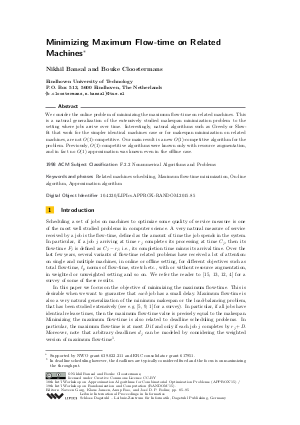Minimizing Maximum Flow-time on Related Machines
Authors Nikhil Bansal, Bouke Cloostermans
-
Part of:
Volume:
Approximation, Randomization, and Combinatorial Optimization. Algorithms and Techniques (APPROX/RANDOM 2015)
Part of: Series: Leibniz International Proceedings in Informatics (LIPIcs)
Part of: Conference: International Conference on Randomization and Computation (RANDOM)
Part of: Conference: International Conference on Approximation Algorithms for Combinatorial Optimization Problems (APPROX) - License:
 Creative Commons Attribution 3.0 Unported license
Creative Commons Attribution 3.0 Unported license
- Publication Date: 2015-08-13
File

PDF
LIPIcs.APPROX-RANDOM.2015.85.pdf
- Filesize: 427 kB
- 11 pages
Document Identifiers
Subject Classification
Keywords
- Related machines scheduling
- Maximum flow-time minimization
- On-line algorithm
- Approximation algorithm
Metrics
- Access Statistics
-
Total Accesses (updated on a weekly basis)
0PDF Downloads0Metadata Views
Abstract
We consider the online problem of minimizing the maximum flow-time on related machines. This is a natural generalization of the extensively studied makespan minimization problem to the setting where jobs arrive over time. Interestingly, natural algorithms such as Greedy or Slow-fit that work for the simpler identical machines case or for makespan minimization on related machines, are not O(1)-competitive. Our main result is a new O(1)-competitive algorithm for the problem. Previously, O(1)-competitive algorithms were known only with resource augmentation, and in fact no O(1) approximation was known even in the offline case.
Cite As Get BibTex
Nikhil Bansal and Bouke Cloostermans. Minimizing Maximum Flow-time on Related Machines. In Approximation, Randomization, and Combinatorial Optimization. Algorithms and Techniques (APPROX/RANDOM 2015). Leibniz International Proceedings in Informatics (LIPIcs), Volume 40, pp. 85-95, Schloss Dagstuhl – Leibniz-Zentrum für Informatik (2015)
https://doi.org/10.4230/LIPIcs.APPROX-RANDOM.2015.85
BibTex
@InProceedings{bansal_et_al:LIPIcs.APPROX-RANDOM.2015.85,
author = {Bansal, Nikhil and Cloostermans, Bouke},
title = {{Minimizing Maximum Flow-time on Related Machines}},
booktitle = {Approximation, Randomization, and Combinatorial Optimization. Algorithms and Techniques (APPROX/RANDOM 2015)},
pages = {85--95},
series = {Leibniz International Proceedings in Informatics (LIPIcs)},
ISBN = {978-3-939897-89-7},
ISSN = {1868-8969},
year = {2015},
volume = {40},
editor = {Garg, Naveen and Jansen, Klaus and Rao, Anup and Rolim, Jos\'{e} D. P.},
publisher = {Schloss Dagstuhl -- Leibniz-Zentrum f{\"u}r Informatik},
address = {Dagstuhl, Germany},
URL = {https://drops.dagstuhl.de/entities/document/10.4230/LIPIcs.APPROX-RANDOM.2015.85},
URN = {urn:nbn:de:0030-drops-52964},
doi = {10.4230/LIPIcs.APPROX-RANDOM.2015.85},
annote = {Keywords: Related machines scheduling, Maximum flow-time minimization, On-line algorithm, Approximation algorithm}
}
Author Details
References
-
Susanne Albers. Introduction to scheduling, chapter Online scheduling, pages 51-73. Chapman and Hall/CRC, 2010.

-
Christoph Ambühl and Monaldo Mastrolilli. On-line scheduling to minimize max flow time: an optimal preemptive algorithm. Oper. Res. Lett., 33(6):597-602, 2005.

-
S. Anand, Karl Bringmann, Tobias Friedrich, Naveen Garg, and Amit Kumar. Minimizing maximum (weighted) flow-time on related and unrelated machines. In ICALP (1), pages 13-24, 2013.

-
S. Anand, Naveen Garg, and Amit Kumar. Resource augmentation for weighted flow-time explained by dual fitting. In Proceedings of the Twenty-Third Annual ACM-SIAM Symposium on Discrete Algorithms, SODA, pages 1228-1241, 2012.

-
Yossi Azar. On-line load balancing. In Amos Fiat and Gerhard J. Woeginger, editors, Online Algorithms, volume 1442 of Lecture Notes in Computer Science, pages 178-195. Springer, 1998.

-
Yossi Azar, Bala Kalyanasundaram, Serge A. Plotkin, Kirk Pruhs, and Orli Waarts. On-line load balancing of temporary tasks. J. Algorithms, 22(1):93-110, 1997.

-
Nikhil Bansal and Janardhan Kulkarni. Minimizing flow-time on unrelated machines. In Symposium on Theory of Computing, STOC, 2015, to appear.

-
Michael A. Bender, Soumen Chakrabarti, and S. Muthukrishnan. Flow and stretch metrics for scheduling continuous job streams. In Proceedings of the Ninth Annual ACM-SIAM Symposium on Discrete Algorithms, SODA, pages 270-279, 1998.

-
Niv Buchbinder and Joseph Naor. The design of competitive online algorithms via a primal-dual approach. Foundations and Trends in Theoretical Computer Science, 3(2-3):93-263, 2009.

-
Chandra Chekuri and Benjamin Moseley. Online scheduling to minimize the maximum delay factor. In Proceedings of the twentieth Annual ACM-SIAM Symposium on Discrete Algorithms, pages 1116-1125. Society for Industrial and Applied Mathematics, 2009.

-
Yookun Cho and Sartaj Sahni. Bounds for list schedules on uniform processors. SIAM Journal on Computing, 9(1):91-103, 1980.

-
Naveen Garg. Minimizing average flow-time. In Efficient Algorithms, Essays Dedicated to Kurt Mehlhorn on the Occasion of His 60th Birthday, pages 187-198, 2009.

-
Sungjin Im, Benjamin Moseley, and Kirk Pruhs. A tutorial on amortized local competitiveness in online scheduling. SIGACT News, 42(2):83-97, 2011.

-
Bala Kalyanasundaram and Kirk Pruhs. Speed is as powerful as clairvoyance. J. ACM, 47(4):617-643, 2000.

-
Kirk Pruhs, Jiri Sgall, and Eric Torng. Handbook of Scheduling: Algorithms, Models, and Performance Analysis, chapter Online Scheduling. CRC Press, 2004.

